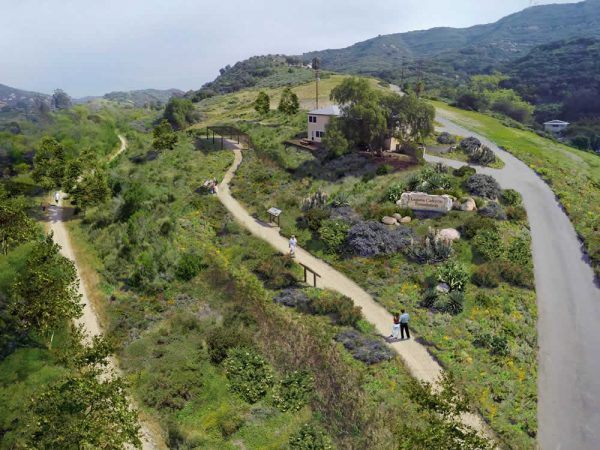The Laguna Canyon Foundation is making plans to relocate to a ‘40s canyon ranch house this year, the first time its staff and volunteers will have a home base within the open space they protect.

The new headquarters is at the base of Stairsteps Trail, one of the only entrances into the Aliso Wood Canyon Wilderness Park. Beyond it lies 100 acres of zoned open space, once part of a 194-acre working ranch populated by chickens, pigs, ducks and horses originally owned by the DeWitt family.
The city purchased the acreage off Laguna Canyon Road in 1990 for $2 million with a grant obtained through Proposition 70, the California Wildlife, Coastal, and Park Land Conservation Act, according to public city records.
The land extends from the south side of Anneliese’s School to Phillips Road, north of the Sun Valley neighborhood.
Last February, the foundation signed a $1 a year lease with the city for the ranch house and began making plans for restoration and renovation. “The coastal sage scrub and cactus communities have been degraded by hundreds of years of cattle grazing and neglect,” Hallie Jones, the foundation’s executive director, said in a fundraising appeal letter, adding that the ranch house has been “un-loved for decades.” The foundation’s current office is located in Legion Hall on Legion Street.
The 20-year lease with a provision for one five-year extension stipulates that LCF will be responsible for maintenance and restoration of the house. LCF will be required to obtain permits and city manager approval for all work done. The city will provide casualty insurance while LCF must provide $5 million in general liability insurance, according to the lease terms.
Heavy rainfall in 2010 exposed a debris field on the property, uphill of the house. The debris was the result of 20 years of garbage-burning by residents in the 1940s and 1950s. In 2014, after the waste was removed and a tenant vacated the house, the city hired LCF to restore the property to a natural state. Now, while the remediation is complete, LCF continues to work on restoration and monitoring at the site, their website says. “We are absolutely thrilled to be creating our new headquarters in Laguna Canyon,” Jones said in an email.
In addition to repairing the house and developing outdoor space for public programs, a native plant garden and interpretive trails are planned. This “will allow us to be even more effective in our habitat restoration, education, and trail work programs,” Jones said.
In a staff report last January, LCF estimated that structural and external improvements would cost approximately $600,000.
Calling the anticipated relocation part of the foundation’s maturation, board President Michelle Kremer described it as a major undertaking. “This project is more than new headquarters. We’re creating a home base for our fight to protect our open space, and a place for our community to learn about and appreciate our precious greenbelt.”
Michael Pinto, Elisabeth Brown and Carolyn Wood founded the Laguna Canyon foundation to channel support for regional open space preservation in 1990, the year following a march that drew thousands of demonstrators protesting Irvine Company plans to build 3,500 homes in Laguna Canyon. Brown and Wood remain on the board, serving as vice president and secretary, respectively. Jones, who grew up in the canyon, is the third executive director taking over from Max Borella, who served in that capacity after Pinto stepped down in 2010.
The foundation works with state, county and city landowners to manage and preserve the 22,000-acre Laguna Coast Wilderness. Its fundraising previously supported efforts to increase public awareness of wilderness, acquire land for preservation, restore wildlife habitats, and maintain and improve the 70-mile trail system in Laguna Coast Wilderness Park and Aliso and Wood Canyons Park. In addition, the foundation provides free interpretive programs and standards-based nature programs for schoolchildren in grades two through five, according to their website.
Year-end revenue reported in 2014 by LCF was $765,500, the most recent figures available on Guidestar, the website that tracks non-profits. The budget funded restoration projects costing $430,166, education programs of $159,000, public programs of $146,200 and trail maintenance amounting to $130,347.
Kremer expressed confidence that the city partnership and support of members will bring to fruition plans for the new headquarters and for returning the surrounding hillsides of the De Witt parcel to a healthy natural habitat. With equal enthusiasm Jones added, “now we just have to raise the money to do it.”




